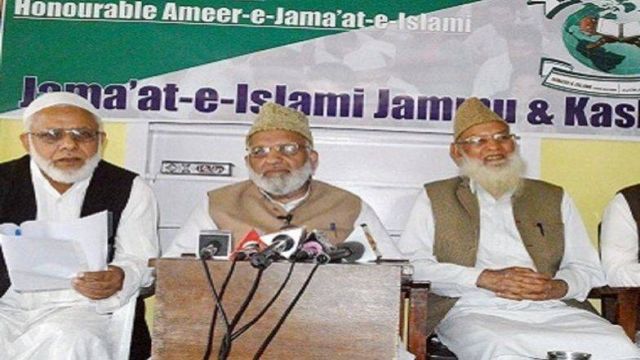
by Editor | May 25, 2021 | News, Politics
 By Sheikh Qayoom,
By Sheikh Qayoom,
Srinagar : For Jamaat-e-Islami (JI) Jammu and Kashmir the ban imposed on the socio-political religious organisation by the union government is not the first and perhaps not the last.
The government on Thursday declared the JI Jammu and Kashmir as “an unlawful association whose activities have the potential of disrupting the unity and integrity of India”.
Before imposing the five-year-long ban, more than 250 leaders and cadres of the organisation were picked up by police during nocturnal raids throughout the Valley.
After lodging them in local police stations, many senior leaders of the JI have been shifted to the central jail in Srinagar city.
The Joint Resistance Leadership (JRL), the separatist conglomerate headed by Syed Ali Geelani, Mirwaiz Umer Farooq and Muhammad Yasin Malik, called for post Friday prayer protests against the ban.
The authorities reacted by imposing restrictions in parts of Srinagar city to prevent any protests.
The ban order has been criticised by some mainstream politicians, including former Chief Minister Mehbooba Mufti.
Mehbooba said: “Democracy is a battle of ideas. The crackdown, followed by the banning of Jammat Islami is condemn able and another example of high handedness and muscular approach of the GOI (Govenment of India) to deal with the political issue of J&K”.
Separatist leaders in both the Syed Ali Geelani headed group and Mirwaiz Umer headed Hurriyat group have condemned the ban with one voice.
The authorities have placed Mirwaiz Umer under house arrest while Geelani continues to be under house arrest in Srinagar city.
Muhammad Yasin Malik is also under preventive detection.
JI Jammu and Kashmir is distinct from Jamaat-e-Islami Hind that was founded in 1948 as an Islamic organisation, but finally split into three offshoots in India, Pakistan and Bangladesh.
The founder of the Jamaat-e-Islami Hind, Sayyid Abul Ala Maududi, however, continues to the beacon light for the JI J&K as well.
The JI was first banned in 1975 during the emergency for opposing the Indira-Abdullah accord that finally brought back the National Conference (NC) founder, Sheikh Muhammad Abdullah, into mainstream politics.
The organisation was again banned by the central government headed by V.P.Singh in 1990. That order was revoked in 1993 by the P.V. Narasimha Rao headed Congress government.
JI leaders, including Muhammad Yusuf Shah, who later became the supreme commander of the Hizbul Mujahideen outfit in his new avatar as Syed Salahudin, fought the 1987 assembly elections with other leaders who opposed the NC under the banner of the Muslim United Front (MuF).
It is generally believed that many JI candidates, including Muhammad Yusuf Shah were defeated by a false declaration of results.
Senior JI leader Geelani, however, won the 1987 assembly elections repeating his victories in 1972 and 1977.
Geelani has been a part of the state’s electoral process till the JI decided to say goodbye to mainstream politics after 1990.
Many people believe that the single biggest reason for the JI cadres supporting militancy and separatism was their engineered defeat during the 1987 elections.
After ending their association with electoral politics, senior JI leaders supported the state’s merger with Pakistan, although the JI cadres did not initially pick up weapons to join the armed struggle till militancy took the centre stage in the Valley in 1989.
Since the pro-azadi Jammu and Kashmir Liberation Front (JKLF) advocated an
independent state free from both India and Pakistan, the Hizbul Mujahideen (HM) that had a predominant number of youth belonging to families of JI cadres was formed in September 1989.
HM stands for state’s merger with Pakistan.
After the HM was formed, the official crackdown on JI-run schools and other
organisations involved in fund raising started.
Geelani, who heads his faction of the separatist Hurriyat group, has formed his own organisation called the Tehreek-e-Hurriyat, but continues to wield both respect and influence in the JI.
(Sheikh Qayoom can be reached at sheikh.abdul@ians.in)
—IANS
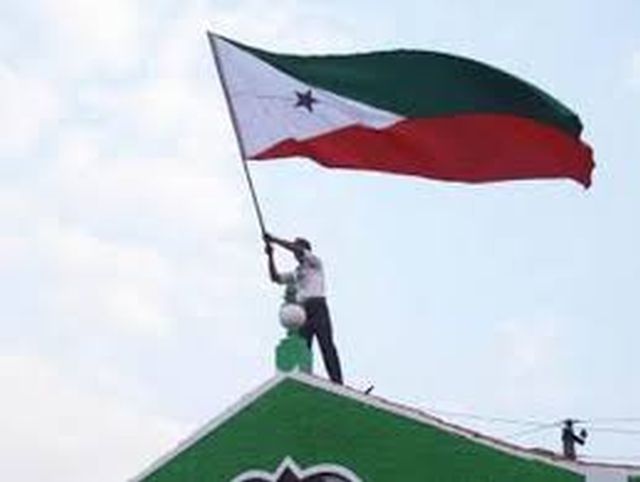
by Editor | May 25, 2021 | News, Politics
 By Pervez Bari, Maeeshat.in,
By Pervez Bari, Maeeshat.in,
Bhopal: In the context of the upcoming Lok Sabha elections, the Popular Front of India, (PFI), will convene a “Muslim Political Conclave” in the national capital on 6th March 2019 to submit a “People’s Charter of Demands” on behalf of the minority community before the contesting political parties.
Muslim scholars, activists and leaders have been invited from different states, which will discuss the current national and state situations and prepare a charter reflecting the concerns of the community for the interested political parties to include in their election manifesto. This decision was taken in the National Executive Council meeting of PFI held at Malappuram in Kerala.
M. Muhammad Ali Jinnah, General Secretary PFI, in a statement said that the meeting observed that, though 2019 Lok Sabha election is being viewed as of paramount importance in the history of the country, the existential and developmental issues of minorities have been largely sidelined in the political discourse of the major political parties who have traditionally used the community as their vote banks. The present Central government is characterised by its extreme anti-minority nature and the resultant rise of violence against Muslims in particular. In lynching incidents, mostly Muslims were killed in the name of beef consumption and the cattle trade.
According to one survey, it is found that hate speeches by elected leaders increased by five times since BJP came to power in 2014. A report of Human Rights Watch says that in most of the mob lynching cases culprits remain unpunished.
Jinnah sad that in Babri Masjid case, the Central government is opposed to justice for the illegally demolished Masjid, rather they are doing everything to prevent justice and ensure Ram Mandir construction on the Babri land. The non-BJP Opposition has relegated Babri Masjid case into a non-issue and has forgotten the promise of reconstruction, made to the nation when it was demolished in 1992. Through the introduction of 10 per cent quota in government jobs on economic grounds, when the Central government tried to destroy the constitutional foundation of reservation, both Congress and Left parties supported this upper caste agenda. And they keep silence over the recommendation of Justice Ranganath Misra Commission to provide 15 per cent reservation for religious minorities.
He pointed out it is to be remembered that it was UPA government which introduced the draconian UAPA, now widely being misused by the Modi Government against minorities and for silencing voices of dissent. The constitution of NIA, another agency which is misused against Muslims, is also a Congress government contribution. No previous secular government at the Centre bothered to remove the oppressive sedition clause from our penal laws.
There is a visible reluctance on the part of major parties even to address Muslims in these changed political circumstances. They often distance themselves from core questions of Muslims and backward minority sections and at times even compete with BJP by championing Hindutva politics even openly. In short, these parties have proved them incapable of standing by the aspirations of the minorities and marginalized sections of this country. The situation demands realistic evaluation of the present situation in the country and effective strategizing on the part of Muslim community for its own future and the future of the country as a secular democratic nation. The proposed Muslim Political Conclave is an attempt at enabling the opposition parties to address the Lok Sabha election on the basis of core secular values enshrined in the Indian constitution.
Chairman E. Abubacker presided over the meeting, which was attended by, General Secretary M. Muhammed Ali Jinnah, Vice Chairman O. M. A. Salam, Secretaries Abdul Wahid Sait, Anis Ahmed and other members of the National Executive Council.
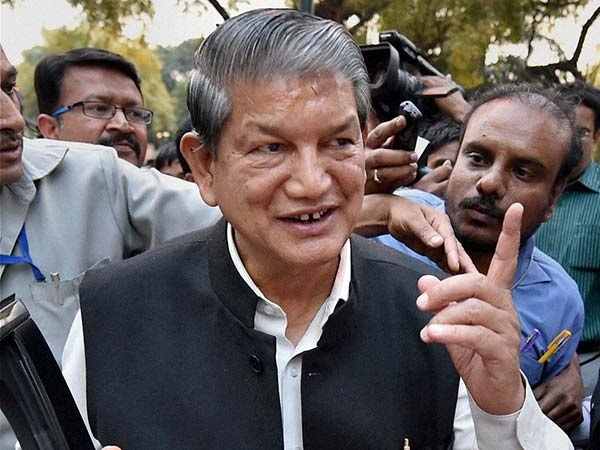
by Editor | May 25, 2021 | News, Politics

Harish Rawat
Dehradun : Congress General Secretary Harish Rawat on Friday said the party will launch sincere efforts to build a grand Ram Temple at Ayodhya if it comes to power after the Lok Sabha elections.
“On two previous occasions, the Congress made sincere attempts to build the Ram temple when it was in power. We will sincerely launch efforts to build the Ram temple if we come to power,” Rawat told reporters here.
Asked whether this the party’s official stand, Rawat quipped: “My statement regarding the Ram temple was widely reported in the media. There is no denial from the Congress.”
He accused the Bharatiya Janata Party (BJP) of being insincere on the issue. “BJP is only doing politics on the Ram temple issue,” said Rawat. The government must work as a facilitator for building the temple, he said.
On the Pulwama suicide bombing, Rawat accused the BJP of projecting Prime Minister Narendra Modi as the only nationalist in the country.
“I have strong objections on the projection of Modi as the only nationalist in India. We all are nationalists. Everybody in the country is a nationalist,” Rawat said.
Criticizing the Uttarakhand BJP government on its budget presented this week, Rawat said the declining agriculture and manufacturing growth in the state was a matter of grave concern.
He said nearly a dozen factories had been closed in the state after the November 7 investors meet. He also claimed that of the nine lakh farmers in the state, 50,000 have quit farming in the past two years.
Rawat said the government’s decision to relax the stringent land laws would force the people to migrate to other states.
“Top industrialists like Adani and Ramdev would buy all the land. There will be no land left for living,” said Rawat.
—IANS
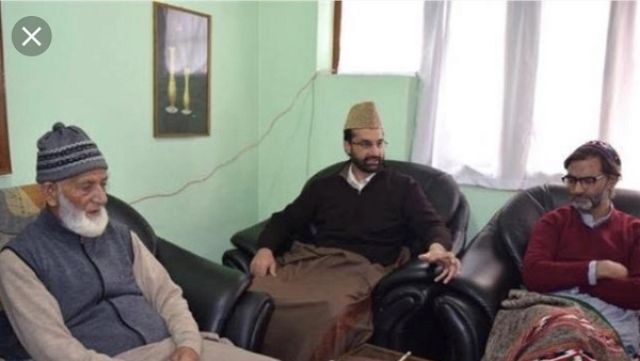
by Editor | May 25, 2021 | News, Politics
 Jammu : Security cover of 18 separatist leaders and 155 Jammu and Kashmir politicians has been withdrawn in the aftermath of the Pulwama attack on February 14 in which over 40 CRPF troopers were killed.
Jammu : Security cover of 18 separatist leaders and 155 Jammu and Kashmir politicians has been withdrawn in the aftermath of the Pulwama attack on February 14 in which over 40 CRPF troopers were killed.
An order issued by the Home Department late on Wednesday said security cover of separatists and some mainstream politicians was also being withdrawn/downgraded apart from those that were initially withdrawn on February 18.
As per the new order, the new list includes names from the National Conference, Peoples Democratic Party (PDP), Bharatiya Janata Party and the Congress.
Some of them are Hurriyat leader Syed Ali Shah Geelani, Jammu Kashmir Liberation Front (JKLF) chief Yasin Malik, former IAS officer Shah Faesal and PDP leader Waheed Para.
“Over 1,000 personal security guards and 100 vehicles provided to the secured persons are being withdrawn,” officials said here.
The security cover of four senior separatist leaders — Mirwaiz Umer Farooq, Shabir Shah, Professor Abdul Gani Bhat and Bilal Lone were already withdrawn on Monday.
The decision to cut down heavily on separatist leaders’ cover was taken in the aftermath of the Pulwama attack when an explosive-packed SUV rammed into a bus of a Central Reserve Police Force convoy on the Jammu-Srinagar highway killing 40 paramilitary troopers on the spot in the worst-ever terror attack in the state since militancy struck there in 1989.
—IANS
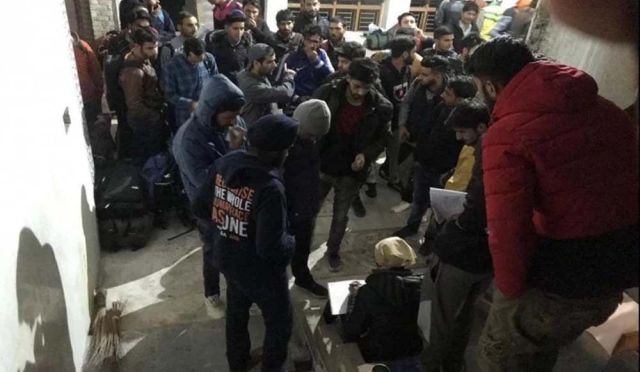
by Editor | May 25, 2021 | News
 Srinagar : Reciprocating the support offered to Kashmiri students and others by Sikhs in Jammu and elsewhere in India after the suicide bombing in Kashmir, Kashmiri Muslims have announced a number of goodwill gestures for the Sikh community in the Kashmir Valley.
Srinagar : Reciprocating the support offered to Kashmiri students and others by Sikhs in Jammu and elsewhere in India after the suicide bombing in Kashmir, Kashmiri Muslims have announced a number of goodwill gestures for the Sikh community in the Kashmir Valley.
“A Sikh brother from Tral owes me Rs 48,000. In view of his weak financial capacity, I have written it off,” said a Kashmiri Muslim on the social media on Thursday.
Free coaching for Sikh students has been announced by a number of coaching centres in the Valley.
Many doctors, especially in south Kashmir’s Anantnag district, have announced free consultation for Sikh patients while some hospitals announced free admission to patients from the community.
Some shopkeepers have announced special discounts for Sikh shoppers. Even vehicle repair workshops at some places said that free service would be provided to Sikh vehicle owners.
“The goodwill announced for the Sikh community is in response to the overwhelming support offered by members of this community to our children studying outside the Valley,” said Nazir Ahmad, a shopkeeper in Srinagar city.
Members of the Sikh community threw open the gates of their religious places in Nanak Nagar locality of Jammu city when Kashmiris felt threatened on February 15 after miscreants torched and damaged many of their vehicles.
“We were told to park our vehicles in the compounds of ‘gurdwaras’ and even in the house compounds of Sikhs in Nanak Nagar area,” said a Muslim who was in Jammu city when authorities had to impose curfew to maintain law and order on February 15.
Reports here said ‘langars’ (free community Kitchens) were set up by the Sikhs in Punjab and some other places for Kashmiri students and other locals doing business outside Jammu and Kashmir.
Media reports said Sikhs also came out in overwhelming support of Kashmiri students studying in Uttarakhand, Haryana, Punjab, Delhi and other states.
—IANS





